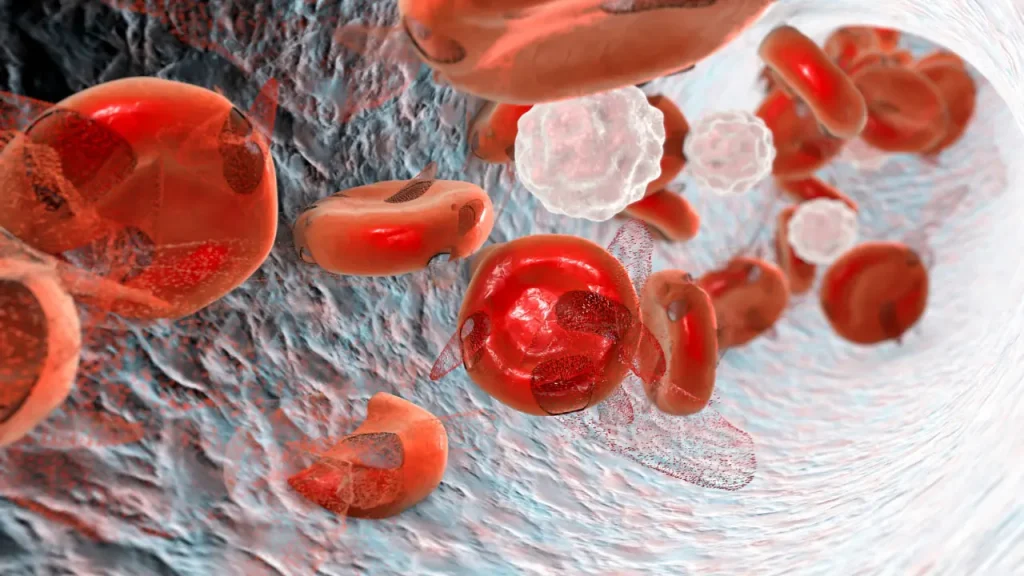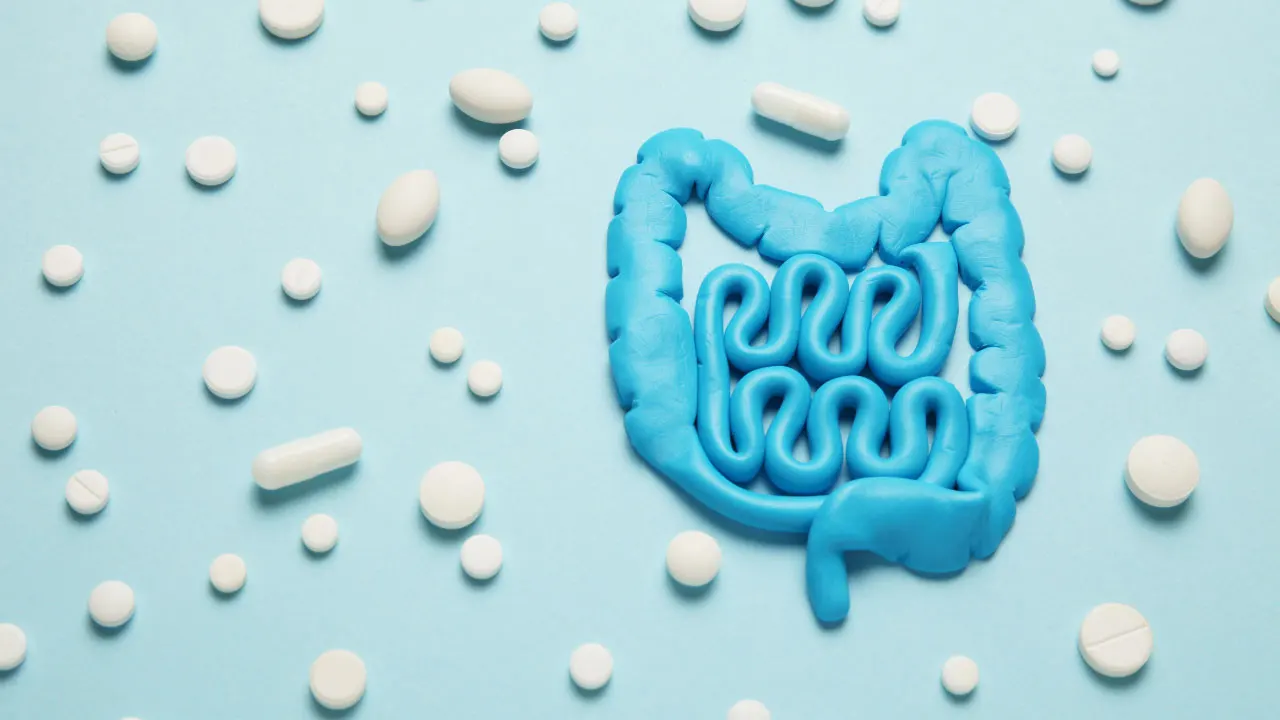Inflammatory bowel disease (IBD) is a group of intestinal disorders that cause prolonged digestive tract inflammation. IBD can include ulcerative colitis, Crohn’s disease, or a lesser-known condition called microscopic colitis. The Crohn’s and Colitis Foundation of America estimates that around 3.1 million people in the United States have IBD. Many diseases are included under the umbrella term IBD, but the two most common are Ulcerative Colitis and Crohn’s Disease.
Crohn’s disease is a chronic inflammatory disease involving any section of the digestive tract. Inflammation can extend entirely through the intestinal wall, often resulting in diarrhea, narrowing, fistulas or abnormal opening, malabsorption of nutrients, and the need for surgical resections of the parts of the digestive tract.
Ulcerative colitis is an inflammatory disease of the colon or large intestine, often accompanied by bloody diarrhea. This type of inflammation does not go through the entire intestinal wall and doesn’t produce fistulas; however, extensive inflammation may eventually require surgery to remove the affected area.
You May Also Like:
THE PERFECT SUPERFOODS FOR GUT HEALTH
Optimize Your Brain Health By Improving Your Gut Health
IBD Doesn’t Have to Ruin Your Life: Quality Vitamins for Gut Inflammation May Help You Find Relief is an original (NewsHealthWatch) article.
Symptoms of inflammatory bowel disease
Symptoms of inflammatory bowel disease vary depending on its location in the digestive tract and the severity of inflammation. However, at the very least, they can be painful and, in the most severe cases, life-threatening.
- Diarrhea
- Bleeding ulcers, which may cause blood to show up in the stool
- Stomach pain, cramping, and bloating due to bowel obstruction
- Weight loss and anemia
- Lack of energy
People with Crohn’s disease may also get canker sores in their mouths. As discussed further in this article, these symptoms may be treated with vitamins for gut inflammation.
IBD can also be associated with problems outside of the digestive tract, such as:
- Eye inflammation
- Skin disorders
- Arthritis
Crohn’s disease is generally more difficult to diagnose than ulcerative colitis because Crohn’s isn’t restricted to one area of the gastrointestinal tract, and the symptoms can be more varied. UC is in the colon, while Crohn’s may appear anywhere from the mouth to the anus. Each location of Crohn’s disease has its symptoms, but there are general signs to watch out for with Crohn’s.
Pain usually begins within an hour after eating and is most often concentrated around the navel, the lower right abdomen, or both. Mild abdominal swelling or bloating is also common with Crohn’s and may be related to food choices.
Somewhere between 17% and 43% of people with Crohn’s will also be diagnosed with perianal disease. About 26% will develop a fistula near the anus. Fistulas create abnormal connections between different parts of your intestine, between your intestine and your skin, or your intestine and other organs. Perianal disease can cause fistulas, fissures, abscesses, or swollen skin tags around the anus.
If there is localized swelling that is painful, accompanied by fever or redness of the skin, it can be a sign of an intestinal blockage, abscess, or significant infection, and the person should seek immediate medical care.

What are the causes of inflammatory bowel disease?
The exact cause of inflammatory bowel disease is unknown; however, several factors can increase your risk of developing ulcerative colitis and Crohn’s disease. They include:
Family history: People with a parent, sibling, or child with IBD are at a much higher risk of developing it themselves, which is why experts believe IBD may have a genetic component.
Immune system: The immune system normally defends the body from pathogens or organisms that cause diseases and infections. A bacterial or viral infection of the digestive tract becomes inflamed as the body tries to fight off the invaders. A healthy immune response causes the inflammation to subside when the infection is gone. However, digestive tract inflammation can occur even without infection in people with IBD. The immune system attacks the body’s cells, known as an autoimmune response. This inflammation may continue for months, years, or even a lifetime.
Smoking: One of the main risk factors for developing Crohn’s disease is smoking, which also aggravates the pain and other symptoms of Crohn’s disease. It also increases the risk of complications. However, ulcerative colitis attacks non-smokers and former smokers as well.
Ethnicity: IBD doesn’t discriminate; it’s found in all populations. However, research shows that certain ethnic groups, including white people and Ashkenazi Jews, are more likely to develop the condition. Studies in the United Kingdom show that IBD rates are also rising in the Black community as well.
Treatments for inflammatory bowel disease
Moderate to severe flares of IBD are often treated with the drugs prednisone, cholestyramine, and sulfasalazine. These medications have side effects that deplete an individual’s store of vital nutrients, although side effects may be buffered with vitamins for gut inflammation.
Prednisone may help relieve swelling during an IBD flareup, but it also affects the absorption of calcium and phosphorus from the small intestine. It also results in the loss of calcium, zinc, potassium, and vitamin C. Continued use of high doses of prednisone may produce bone loss. Individuals taking prednisone may also need to boost their protein intake because this steroid causes protein breakdown.
Cholestyramine decreases the absorption of a wide array of vitamins for gut inflammation, including fat-soluble vitamins A, D, E, and K, as well as folate, vitamin B-12, calcium, and iron. Vitamin D plays a crucial role in bone health, immune function, and overall well-being. Many individuals with IBD have low vitamin D levels, and certain medications can exacerbate this deficiency.
Sulfasalazine interferes with folate absorption, so a folate supplement is recommended for people taking this drug.
Individuals with IBD should work closely with their healthcare providers to develop a regimen that includes vitamins for gut inflammation to mitigate these vitamin and mineral deficiencies. Regular monitoring through blood tests is essential, as well as the need to follow a well-balanced diet that can optimize nutrient intake to help mitigate medication side effects. However, there are nutritional plans that can help alleviate the symptoms of IBD.

Nutritional tips for inflammatory bowel disease
There are lifestyle changes that include modifications to your diet that may ease the symptoms of inflammatory bowel disease. What you eat doesn’t cause the inflammation to intensify, but some types of foods, such as high-fiber fruits and vegetables, may aggravate the symptoms.
There is no one-size-fits-all diet for people with inflammatory bowel disease. Foods that bother one person may not bother another. A diet must be tailored to an individual. Nutritional tips on how to deal with IDB may include vitamins for gut inflammation.
Diet recommendations for inflammatory bowel disease (IBD):
- Follow a low-residue diet to relieve abdominal pain and diarrhea
- Avoid foods that may increase stool output, such as fresh fruits and vegetable
- Decrease concentrated sweets such as juices, candy, and soda
- Decrease alcohol consumption
- Have smaller, more frequent meals
- Try incorporating more omega-3 fatty acids into your diet because they have an anti-inflammatory effect
- Consider taking nutritional supplements such as prebiotics or probiotics to boost gut health
- If you’re having trouble tolerating solid foods, consider taking a nutritional supplement
Best minerals and vitamins for gut inflammation
Growing evidence suggests that certain vitamins and minerals play a vital role in mitigating inflammation and improving gut health. They include:
Vitamin D is best known for its role in bone health, but it can also help modulate inflammation because vitamin D receptors can help regulate immune responses.
Omega-3 Fatty Acids, primarily found in fish oil, flaxseed, and nuts, have potent anti-inflammatory properties. Incorporating omega-3s into your diet may help alleviate gut inflammation and support overall gut health.
Zinc is an essential mineral that plays a vital role in maintaining the integrity of the gut lining. It helps strengthen the barrier function of the intestinal wall, preventing the leakage of toxic substances into the bloodstream, which can trigger inflammation.
Vitamin A also helps regulate the immune response in the gut. It helps maintain the health of the mucous membranes in the gastrointestinal tract and supports the production of immune cells that protect against infections and inflammation.
Vitamin C is a water-soluble vitamin with antioxidant properties. While it’s best known for boosting immunity, vitamin C can also help reduce gut inflammation by scavenging free radicals and supporting the body’s natural defense mechanisms.
Magnesium is a mineral that has a role in muscle and nerve function and is also involved in gut health. It helps relax the digestive tract muscles, reducing the risk of inflammation.
Probiotics are live beneficial bacteria that are crucial for gut health and controlling inflammation. They help maintain a balanced gut microbiome, essential for proper digestion and immune function. Probiotics can help restore and maintain a healthy balance of gut bacteria. In IBD, the gut microbiota is often imbalanced. Probiotics can introduce beneficial bacteria, reduce inflammation by modulating the immune response in the gut, and improve symptoms such as diarrhea and abdominal pain in some individuals.
Prebiotics are non-digestible fibers that serve as food for beneficial gut bacteria. They help stimulate the growth and activity of these bacteria. In IBD, prebiotics can foster the growth of beneficial bacteria, enhance the production of short-chain fatty acids, which have anti-inflammatory properties, and strengthen the gut barrier.
Postbiotics are the compounds produced by probiotics during their fermentation processes. Postbiotics may help regulate the microbiome, provide immune support, and have anti-inflammatory properties, which benefit individuals with inflammatory bowel disease.
Maintaining a healthy gut is essential for health; certain nutrients can significantly reduce gut inflammation and promote digestive health. They contribute to gut health by modulating immune response, inflammation control, and gut barrier support.
If you have trouble maintaining a balanced diet or need added support with additional vitamins for gut inflammation, a high-quality supplement may be a solution. myPEAK PeakBiotic is one of the most reputable supplements to aid the digestive tract on the market.

myPEAK PeakBiotic formula gut inflammation
PeakBiotic, a product made by myPEAK Supplements, is a high-quality blend of minerals and vitamins for gut inflammation, including gut-beneficial prebiotics, probiotics, postbiotics, and gut lining support compounds for superior gut health and microbiome support. The blend uses scientifically researched and specially chosen strains in a high-potency 50 billion CFU. Probiotics are measured in colony-forming units (CFU), which indicate the number of viable cells.
PeakBiotic for gut health also includes a 14-vegan strain blend that supports gut health, specifically optimized digestion, strong gut lining, regular bowel movements, immune system strength, and reduced gas and bloating. PeakBiotic also supports cardiovascular, skin, mood, and brain health in one convenient pill daily. It is physician-formulated, lab-tested, CGMP-certified, and manufactured in the US with clinically proven ingredients.
PeakBiotic was made with your gut in mind. PeakBiotic combines comprehensive gut health supplements and mood probiotics. It promotes optimum digestive health with a 3-stage gut health formula based on leading-edge research with prebiotics, probiotics, and polyphenols. The gut health probiotics are shelf stable with no refrigeration required. The PeakBiotic supplement offered by myPEAK Supplements may, in conjunction with conventional treatment, aid in alleviating some of the symptoms or even addressing the underlying causes of IBD.
Deciding on a remedy to help alleviate the symptoms of inflammatory bowel disease:
What’s next?
Inflammatory bowel disease is a chronic condition that can significantly impact an individual’s physical and emotional well-being. Recognizing that IBD doesn’t have to ruin your life is important. With the proper medical treatment, lifestyle adjustments, and high-quality supplements designed to support the digestive tract, individuals with IBD can lead fulfilling lives and maintain healthy relationships.
Now that you have some information on possible treatments for IBD, including the use of high-quality prebiotic, probiotic, and postbiotic supplements, you can make a more informed decision on managing IBD better.
Taking a holistic approach to gut health, focusing on diet, lifestyle, and stress management can lead to better outcomes in managing inflammatory bowel disease and promoting overall wellness.

For further reading:
Cleveland Clinic: Inflammatory Bowel Disease
New York Times: The wild world inside your gut
Forbes: Crohn’s disease: Symptoms, causes and treatments
CNN: Crohn’s disease means lifelong battle
NBC News: Active bacterial cultures combat bowel disease
Important Note: The information contained in this article is for general informational purposes only and should not be construed as health or medical advice, nor is it intended to diagnose, prevent, treat, or cure any disease or health condition. Before embarking on any diet, fitness regimen, or program of nutritional supplementation, it is advisable to consult your healthcare professional in order to determine its safety and probable efficacy in terms of your individual state of health.
Regarding Nutritional Supplements Or Other Non-Prescription Health Products: If any nutritional supplements or other non-prescription health products are mentioned in the foregoing article, any claims or statements made about them have not be evaluated by the U.S. Food and Drug Administration, and such nutritional supplements or other health products are not intended to diagnose, treat, cure, or prevent any disease.

